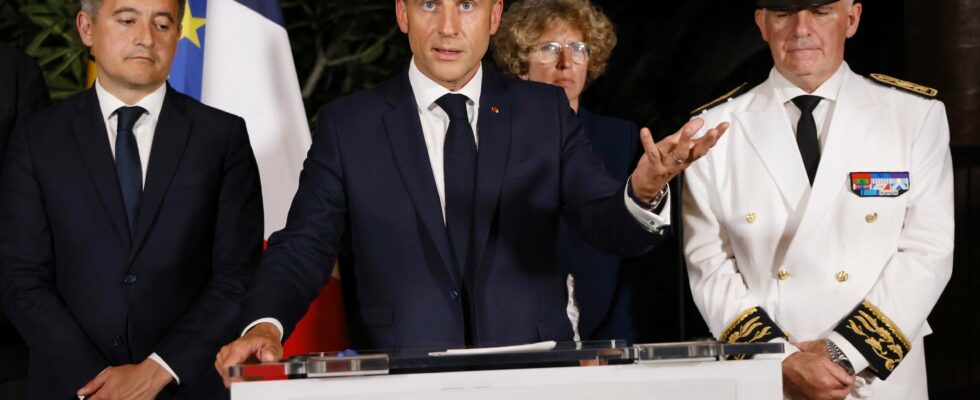The situation remained “difficult”, Sunday May 26, in New Caledonia, where the police are still struggling to control certain districts of Greater Nouméa despite the desire to “restore order” of Emmanuel Macron, who says he ready to submit the contested reform of the electoral body to a national referendum.
Information to remember
⇒ Emmanuel Macron says he is ready to “go to a referendum” on the controversial reform of the electoral body.
⇒ Nouméa airport will remain closed for another week.
⇒ Tensions remain high on the ground.
Macron ready to “go to the referendum”
“I can go to the referendum at any time” on this reform already adopted by the Senate then the National Assembly, argued the Head of State in an interview with Parisian. However, he reiterates his desire to see New Caledonian elected officials agree on “a global agreement which would enrich the text already voted by Parliament”.
The French territory of the South Pacific has been plunged into chaos since May 13, against a backdrop of the adoption in Paris of a reform providing for the unfreezing of the local electoral body, that is to say its enlargement to people established for at least 10 years. Supporters of independence believe that this thaw risks “minorizing” the indigenous Kanak people even more.
Nouméa airport closed until June 2
The international airport will remain closed to commercial flights until at least June 2. This will bring to almost three weeks the closure of this airport, decided the day after the start of violent riots on the French archipelago in the Pacific, and extended several times since.
The road leading to La Tontouta international airport, very degraded in places, is still littered with vehicle wrecks, according to local sources.
French people and foreign tourists stuck on the archipelago should continue to be evacuated from Magenta airfield via military flights chartered by France, Australia or New Zealand.
Still “difficult” situation on the ground
The situation “remains very difficult for the inhabitants of the island, particularly in Greater Nouméa”, noted Saturday evening the Minister for Overseas Affairs, Marie Guévenoux, in a press release.
If the situation is calmer and a semblance of daily life is reborn in places, some neighborhoods remain difficult to access for the police: in Koutio, in the town of Dumbéa, a bank burned down in the night, learned an AFP journalist.
Many roadblocks are still in place, despite the efforts of more than 2,700 police and gendarmes deployed who dismantle them during the night. At Vallée-du-Tir, a still smoking tree trunk and new car wrecks across the road bear witness to the clashes of the night.
The death toll from the violence rose to seven on Friday, the seventh being a 48-year-old man whose identity has not been communicated, killed in Dumbéa by a police officer. The latter was placed in police custody. It was “a plainclothes police officer, who was not on duty” and “was attacked by around twenty individuals as part of a roadblock”, Marie Guévenoux said on Saturday.
“There are no police operations that have led to the death of people,” she stressed, while this death raised fears of a conflagration on the spot. The lifting of the state of emergency is not happening immediately, she added, believing that this can only be done “on the condition that the roadblocks are lifted and calm returns.”
Evacuations of tourists
The French mainland people, who remained stuck in the archipelago due to the riots, are beginning to see the end of the tunnel: the first flights aboard military aircraft took off on Saturday from the Nouméa international airfield towards Australia and New Zealand.
“The wait was interminable, since the reopening of the airport is postponed day by day,” one of these tourists told AFP, while the airport has remained closed to commercial flights since May 14 and at least until Tuesday.
The remains of a 19-year-old separatist, killed in Nouméa on May 15, were repatriated to Maré, the island where he came from and where he is to be buried on Sunday. An impressive crowd was present to welcome the boat which was also transporting students returning to their island, according to images from the Nouvelle-Calédonie La 1ère channel.
FLNKS separatists call for calm
The FLNKS (Kanak and Socialist National Liberation Front), the main pro-independence component, admitted on Saturday that “today, the main objective of the independence movement is to ease tensions and find lasting solutions for our country.”
“In this sense, the FLNKS renews its call for calm and also asks to loosen the grip on the main routes of circulation,” adds the movement in a press release.
The separatists are still demanding the withdrawal of the constitutional reform, which caused the worst violence in 40 years and awakened the specter of the “Events” which, from 1984 to 1988, left nearly 80 dead and feared the plunge of New Caledonia in the civil war.
“I assume a gesture of appeasement and openness but I will never make a decision to postpone or suspend under the pressure of violence,” Emmanuel Macron reiterated to the Parisian. The President of the Republic, during his visit to the island on Thursday, gave elected officials and political leaders of the archipelago until the end of June, helped by a “mediation mission” of three senior officials, to find ” a global agreement” which “can be submitted to the vote of Caledonians”.
